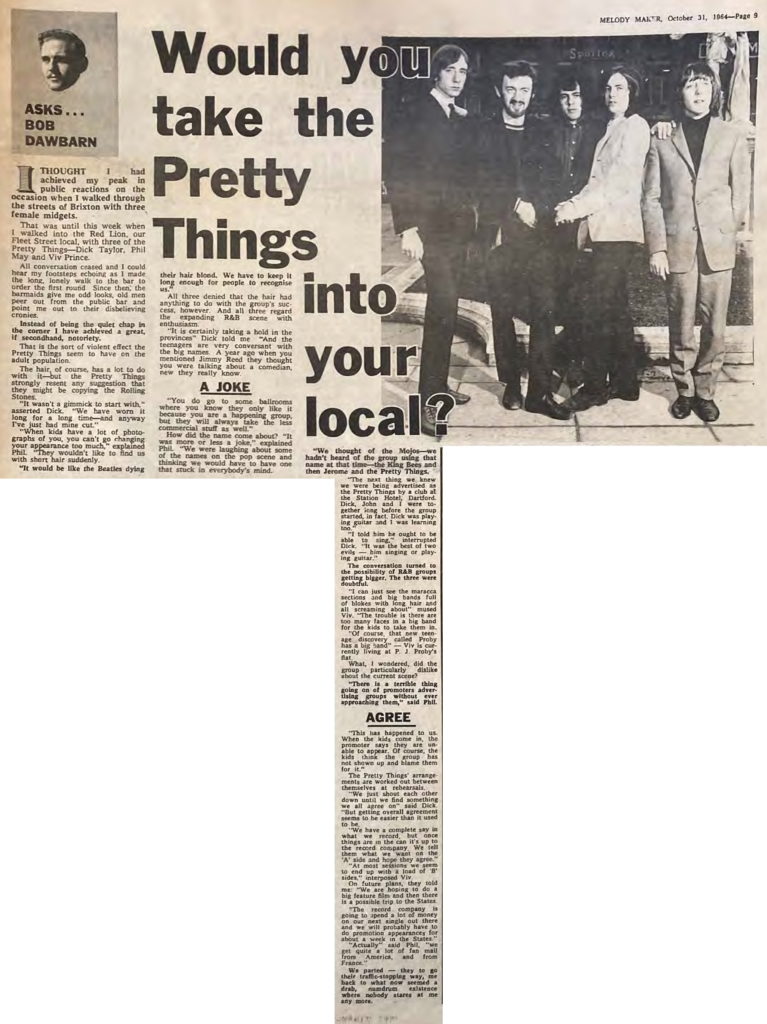Cet article de Bob Dawbarn a paru dans l’hebdomadaire britannique Melody Maker daté du 31 octobre 1964. Les cheveux longs, le nom idiot, la comparaison avec les Rolling Stones, tous les ingrédients sont là pour une présentation du groupe typique de l’époque.

Transcription
I thought I had achieved my peak in public reactions on the occasion when I walked through the streets of Brixton with three female midgets.
That was until this week when I walked into the Red Lion, our Fleet Street local, with three of the Pretty Things—Dick Taylor, Phil May and Viv Prince.
All conversation ceased and I could hear my footsteps echoing as I made the long, lonely walk to the bar to order the first round. Since then, the barmaids give me odd looks, old men peer out from the public bar and point me out to their disbelieving cronies.
Instead of being the quiet chap in the corner I had achieved a great, if secondhand, notoriety.
That is the sort of violent effect the Pretty Things seem to have on the adult population.
The hair, of course, has a lot to do with it—but the Pretty Things strongly resent any suggestion that they might be copying the Rolling Stones.
“It wasn’t a gimmick to start with,” asserted Dick. “We have worn it long for a long time—and anyway I’ve just had mine cut.”
“When kids have a lot of photographs of you, you can’t go changing your appearance too much,” explained Phil. “They wouldn’t like to find us with short hair suddenly.
“It would be like the Beatles dying their hair blond. We have to keep it long enough for people to recognise us.”
All three denied that the hair had anything to do with the group’s success, however. And all three regard the expanding R&B scene with enthusiasm.
“It is certainly talking a hold in the provinces,” Dick told me. “And the teenagers are very conversant with the big names. A year ago when you mentioned Jimmy Reed they thought you were talking about a comedian, now they really know.
“You do go to some ballrooms where you know they only like it because you are a happening group, but they will always take the less commercial stuff as well.”
How did the name come about? “It was more or less a joke,” explained Phil. “We were laughing about some of the names on the pop scene and thinking we would have to have one that stuck in everybody’s mind.
“We thought of the Mojos—we hadn’t heard of the group using that name at that time—the King Bees and then Jerome and the Pretty Things.
“The next thing we knew we were being advertised as the Pretty Things by a club at the Station Hotel, Dartford. Dick, John and I were together long before the group started, in fact, Dick was playing guitar and I was learning too.”
“I told him he ought to be able to sing,” interrupted Dick. “It was the best of two evils—him singing or playing guitar.”
The conversation turned to the possibility of R&B groups getting bigger. The three were doubtful.
“I can just see the maracca sections and the big bands full of blokes with long hair and all screaming about,” mused Viv. “The trouble is there are too many faces in a big band for the kids to take them in.
“Of course, that new teenage discovery called Proby has a big band”—Viv is currently living at P. J. Proby’s flat.
What, I wondered, did the group particularly dislike about the current scene?
“There is a terrible thing going on of promoters advertising groups without ever approaching them,” said Phil.
“This has happened to us. When the kids come in, the promoter says they are unable to appear. Of course, the kids think the group has not shown up and blame them for it.”
The Pretty Things’ arrangements are worked out between themselves at rehearsals.
“We just shout each other down until we find something we all agree on,” said Dick. “But getting overall agreement seems to be easier than it used to be.
“We have a complete say in what we record, but once things are in the can it’s up to the record company. We tell them what we want on the ‘A’ side and hope they agree.”
“At most sessions we seem to end up with a load of ‘B’ sides,” interposed Viv.
On future plans, they told me: “We are hoping to do a big feature film and then there is a possible trip to the States.
“The record company is going to spend a lot of money on our next single out there and we will probably have to do promotion appearances for about a week in the States.”
“Actually,” said Phil, “we get quite a lot of fan mail from America, and from France.”
We parted—they to go their traffic-stopping way, me back to what now seemed a drab, humdrum existence where nobody stares at me any more.
Source : WorldRadioHistory.com (PDF).